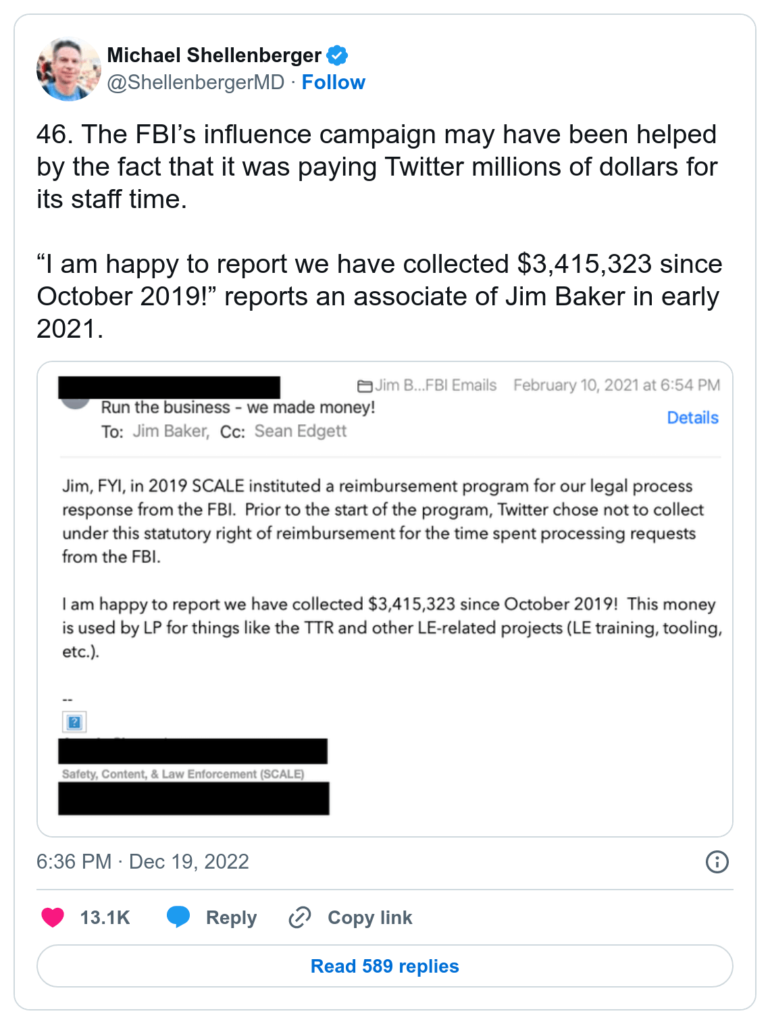There’s been a lot of irresponsible faux journalism surrounding the “Twitter Files,” a batch of internal company documents that Elon Musk released to a couple of handpicked friendly bloggers. But a Twitter thread earlier today claimed that the FBI paid Twitter to influence the social media company’s content moderation decisions. It’s one of the more preposterous claims in this space (though it has a lot of competition), and it evinces a total misunderstanding of the interactions between technology companies and law enforcement.
Michael Shellenberger is the author of this particular thread. I’m not going to characterize the argument made in the thread; it’s not worth summarizing, and, to the extent it makes sense at all, it only has a convoluted conspiracy-theory sort of logic. But the particular Tweet in question claims that Twitter might have suppressed content because the FBI paid it:

The internal Twitter email refers to “a reimbursement program for our legal process response from the FBI” and says that Twitter collected almost $3.5 million dollars over a period of about 16 months. Shellenberger suggests that Twitter made certain content moderation decisions, including suppressing news about the files leaked from Hunter Biden’s laptop, because of the money it was paid by the FBI. Other participants in the conversation bleated that the FBI “bribed” Twitter and argued that FBI officials involved should be charged with crimes. None of this analysis is accurate.
There are several federal laws that require tech companies to produce information to the government. A good example is the Stored Communications Act, which authorizes the government to require tech companies to turn over communications in response to a judicial warrant. For example, if the FBI were investigating a criminal conspiracy and had evidence that the conspirators communicated via Twitter, the FBI might be able to get a warrant from a judge and require Twitter to produce the conspirators’ messages.
Complying with such orders takes time and resources. The company needs to identify the information responsive to the warrant, package it in a coherent format, and transmit it to the requesting government agency. That process might be disruptive to the company, and would certainly take employees away from their normal duties. As a result, the law requires that the government reimburse the tech company for the cost of compliance:
a governmental entity obtaining the contents of communications, records, or other information under . . . this title shall pay . . . a fee for reimbursement for such costs as are reasonably necessary and which have been directly incurred in searching for, assembling, reproducing, or otherwise providing such information. Such reimbursable costs shall include any costs due to necessary disruption of normal operations of any electronic communication service or remote computing service in which such information may be stored.
18 U.S.C. § 2706
Two important points here. First, this isn’t anything secret or nefarious. It’s a public law that’s been on the books since the 1980s. Shellenberger could have found this with a few seconds of research—or any basic level of knowledge about law enforcement disclosures. Second, it’s ludicrous to suggest that these payments, which had nothing to do with content moderation in general or Hunter Biden’s laptop in particular, could have influenced Twitter. The FBI was required by law to reimburse Twitter for its compliance with these orders. Nothing Twitter did or didn’t do with respect to content moderation would have had any effect on whether Twitter would continue receiving compensation from the FBI.